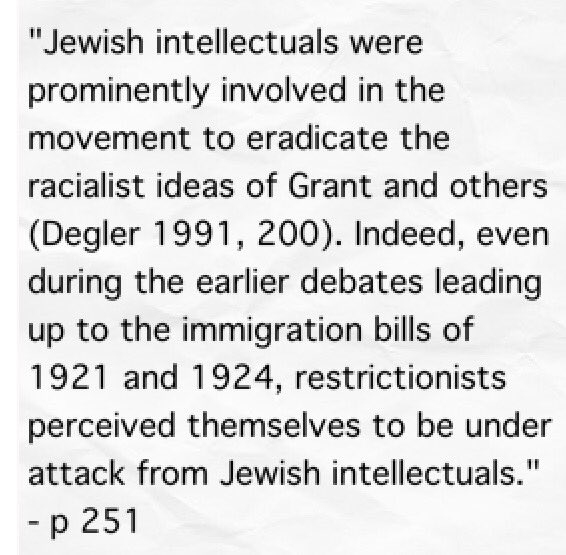
1/ “Jewish involvement in altering the intellectual discussion of race and ethnicity appears to have had long term repercussions on U.S. immigration policy, but Jewish political involvement was ultimately of much greater significance.” - p 258
2/ “Jews have been ‘the single most persistent pressure group favoring a liberal immigration policy’ in the United States in the entire immigration debate beginning in 1881 (Neuringer 1971, 392-393).” - p 258
3/ “‘In undertaking to sway immigration policy in a liberal direction, Jewish spokespersons and organizations demonstrated a degree of energy unsurpassed by any other interested pressure group.’” - p 258
4/ “‘Immigration had constituted a prime object of concern for practically every major Jewish defense and community relations organization.’” - p 258
5/ “‘Over the years, their spokespersons had assiduously attended congressional hearings, and the Jewish effort was of the utmost importance in establishing and financing such...groups as the National Immigration League and the Citizens Committee for Displaced Persons.’” - p 259
6/ “Throughout the almost 100 years prior to achieving success with the immigration law of 1965, Jewish groups opportunistically made alliances with other groups whose interests temporarily converged with Jewish interests...” - p 259
7/ “Particularly noteworthy was the support of a liberal immigration policy from industrial interests wanting cheap labor, at least in the period prior to the 1924 temporary triumph of restrictionism.” - p 259
8/ “Within this constantly shifting set of alliances, Jewish organizations persistently pursued their goals of maximizing the number of Jewish immigrants and opening up the United States to immigrarion from all the peoples of the world.” - p 259
9/ “As indicated in the following, the historical record supports the proposition that making the United States into a multicultural society has been a major Jewish goal beginning in the nineteenth century.” - p 259
10/ “‘Jews, as a result of their intellectual energy and economic resources, constituted an advance guard of the new peoples who had no feeling for the traditions of rural America’ (Higham 1984, 168-169).” - p 259-260
11/ “Although often concerned that Jewish immigration would fan the flames of anti-Semitism...Jewish leaders fought a...successful delaying action against restrictions on immigration...from 1891-1924, particularly as they affected the ability of Jews to immigrate.” - p 260
12/ “Their efforts continued despite the fact that by 1905 there was ‘a polarity between Jewish and general American opinion on immigration’ (Neuringer 1971, 83).” - p 260
13/ “In particular, whereas other religious groups such as Catholics and ethnic groups such as the Irish had divided and ambivalent attitudes toward immigration...Jewish groups engaged in an intensive and sustained effort against attempts to restrict immigration.” - p 260
• • •
Missing some Tweet in this thread? You can try to
force a refresh









